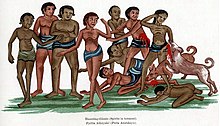Pretas
|
A Burmese depiction of hungry ghosts (pyetta).
|
|
| Grouping | Legendary creature |
|---|---|
| Sub grouping | Nocturnal, revenant |
| Similar creatures | Ancestor spirits, krasue |
| Mythology |
Indian religions Chinese folk religion Vietnamese folk religion |
| Other name(s) | Hungry ghost |
| Region | East, South and Southeast Asia |
| Habitat |
Hinduism shmashanas or cemetery Buddhism Hungry Ghost Realm |
| Translations of Preta |
|
|---|---|
| Sanskrit | प्रेत IAST: Preta |
| Burmese |
ပြိတ္တာ (IPA: [[Help:IPA for Burmese|[[peiʔtà]]]]) |
| Chinese |
餓鬼 (Pinyin: Èguǐ) |
| Japanese |
餓鬼 (rōmaji: Gaki) |
| Korean |
아귀 (RR: Agui) |
| Lao | ເຜດ (/pʰèːt/) |
| Mon |
ပြိုတ် ([[prɒt]]) |
| Shan |
ၽဵတ်ႇ ([phet2]) |
| Tibetan | ཡི་དྭགས་ (yi dwags) |
| Thai | (rtgs: pret) |
| Vietnamese | ngạ quỷ, quỷ đói |
| Glossary of Buddhism | |
Preta (Sanskrit: प्रेत) is the Sanskrit name for a type of supernatural being described in Hinduism, Buddhism, Taoism and Chinese and Vietnamese folk religion as undergoing suffering greater than that of humans, particularly an extreme level of hunger and thirst. They have their origins in Indian religions and have been adopted into East Asian religions via the spread of Buddhism. Preta is often translated into English as "hungry ghost" from the Chinese adaptation. In early sources such as the Petavatthu, they are much more varied. The descriptions below apply mainly in this narrower context.
Pretas are believed to have been false, corrupted, compulsive, deceitful, jealous or greedy people in a previous life. As a result of their karma, they are afflicted with an insatiable hunger for a particular substance or object. Traditionally, this is something repugnant or humiliating, such as cadavers or feces, though in more recent stories, it can be anything, however bizarre.
The Sanskrit term preta means "departed, deceased, a dead person", from pra-ita, literally "gone forth, departed". In Classical Sanskrit, the term refers to the spirit of any dead person, but especially before the obsequial rites are performed, but also more narrowly to a ghost or evil being. The Sanskrit term was taken up in Buddhism to describe one of six possible states of rebirth. The Chinese term egui (餓鬼), literally "starving ghost", is thus not a literal translation of the Sanskrit term.
Pretas are invisible to the human eye, but some believe they can be discerned by humans in certain mental states. They are described as human-like, but with sunken, mummified skin, narrow limbs, enormously distended bellies and long, thin necks. This appearance is a metaphor for their mental situation: they have enormous appetites, signified by their gigantic bellies, but a very limited ability to satisfy those appetites, symbolized by their slender necks.
...
Wikipedia

